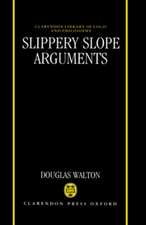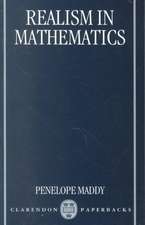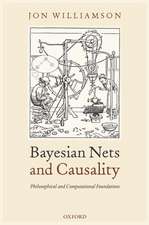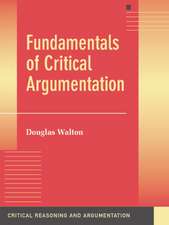Arguments from Ignorance
Autor Douglas Waltonen Limba Engleză Paperback – 14 sep 1995
This book makes an original contribution in the areas of argumentation theory and informal logic, contending that, despite its traditional classification as a fallacy, the argument from ignorance is a genuine, very common, and legitimate type of argumentation with an identifiable structure. But the book is also interdisciplinary in scope, explaining many widely interesting and controversial subjects in artificial intelligence, medical education, philosophy of science, and philosophy of law in a clear way that makes it accessible to a broad range of readers.
Preț: 338.25 lei
Nou
Puncte Express: 507
Preț estimativ în valută:
64.74€ • 70.35$ • 54.42£
64.74€ • 70.35$ • 54.42£
Carte tipărită la comandă
Livrare economică 22 aprilie-06 mai
Preluare comenzi: 021 569.72.76
Specificații
ISBN-13: 9780271014753
ISBN-10: 027101475X
Pagini: 326
Dimensiuni: 152 x 229 x 25 mm
Greutate: 0.55 kg
Ediția:New.
Editura: Penn State University
ISBN-10: 027101475X
Pagini: 326
Dimensiuni: 152 x 229 x 25 mm
Greutate: 0.55 kg
Ediția:New.
Editura: Penn State University
Textul de pe ultima copertă
Arguments from Ignorance explores the situations in which the argument from ignorance (also known as the lack-of-knowledge inference, negative evidence, or default reasoning) functions as a respectable form of reasoning and those in which it is indeed fallacious. Douglas Walton draws on everyday conversations on all kinds of practical matters in which the argumentum and ignorantiam is used quite appropriately to infer conclusions. He also discusses the inappropriate use of this kind of argument, referring to various major case studies, including the Salem witchcraft trials, the McCarthy hearings, and the Alger Hiss case. This book makes an original contribution in the areas of argumentation theory and informal logic, contending that, despite its traditional classification as a fallacy, the argument from ignorance is a genuine, very common, and legitimate type of argumentation with an identifiable structure. But the book is also interdisciplinary in scope, explaining many widely interesting and controversial subjects in artificial intelligence, medical education, philosophy of science, and philosophy of law in a clear way that makes it accessible to a broad range of readers.



















